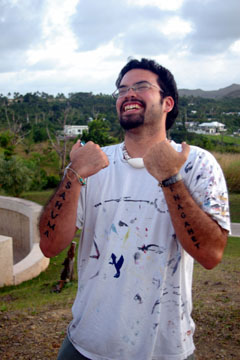The Insular Empire
 For the past few months I've been slowly working on narration pieces for a documentary on Chamorros and the Marianas Islands that coming out soon called The Insular Empire. The documentary is being made by Vanessa Warheit and Amy Robinson of Horse Opera Productions, and is a very interesting intervention into the ambiguous political existences of the people in Guam and the Commonwealth of the Northern Marianas Islands.
For the past few months I've been slowly working on narration pieces for a documentary on Chamorros and the Marianas Islands that coming out soon called The Insular Empire. The documentary is being made by Vanessa Warheit and Amy Robinson of Horse Opera Productions, and is a very interesting intervention into the ambiguous political existences of the people in Guam and the Commonwealth of the Northern Marianas Islands.Click on the link above to read more about the directors, producers and scope of the film, but there is one section from their synopsis page, which I think sums up well what the filmmakers are trying to do:
"...most portrayals of the Mariana Islands fall back on easy stereotypes of 'paradise' lost or found, or ignore issues of political status, economic realities, or indigenous rights altogether. The Insular Empire: America's Pacific Frontier - intended for national public television broadcast, educational curricula, and community outreach efforts - will tell a different story. Through indigenous Chamorro and Carolinian voices, it will tell a tale of what it feels like to be a colonial subject of the 'greatest democracy on earth.' Americans will thus come face to face with the long, tangled and concrete relationship between US democracy and US empire."
Gof ya-hu este na sinangan, "what it feels like to be a colonial subject of 'the greatest democracy on earth." Estague muna'gof klåru i lina'la' i Chamoru pa'go. Hunggan ti manachaichaigua hamyo yan i magåhet na Amerikånu siha. Lao ti siña en sangan pat prueba na sahnge i islan-miyu lokkue, sa' mandaña hamyo gi lai, ekonomia yan i mas impotante na kosas, militat.
Ya un tungo' hafa muna'puputi i Chamoru i mas atdet put este na estao? I Chetnot Tintanos Amerikånu, kumekeilek-ña na desde famagu'on hit, manmana'malago umamerikånu, umunu yan i Amerikånu siha. Manmafa'na'na'gue hit put siha gi todu i ligat giya Guahan, eskuela, gubetno, telebishon, ya todu tiempo manlisto hit para ta prueba na Manggof Amerikånu i Chamoru siha! Pues bula tiningo'-ta put siha, lao ginnen i bandan-ñiha, hafa guaguaha? Sen didide’ ha’! Pinat taya'!!

Over the next few days I guess I'll share some of these pieces that I've written with everyone. At first I was going to call them Dispatches from the Edge of American Empire, but since there are so many places that could also take this name, I'll just call them Dispatches from Guam.



Comments